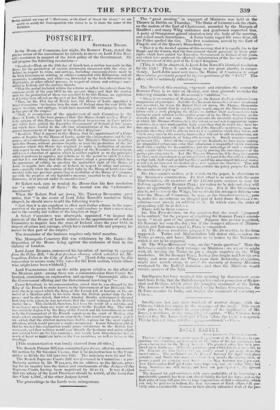The. Standard, this evening, expounds and eulogizes the coarse Sir
ROBERT PEEL is to take on Monday, and then proceeds to make the following remarks on Mr. DI:NCO:III:Cs " addition "- " There is no courtint, of Radicals—Lin Sir Robert Peers resolutions;—no compromise of principles. A.nd this the Riviicals thou -lice at once di,cocered and resented ; fur W ',len Sir Robert Peel sat down, Mr. Thomas Doneombe started up to signify that he and his party would supip.at the Minisierial reso- In ion with a tack, pledging the House to further their 1111,venwilt,—,t tack having as much relation to the matter proposed by the Home Sticretiny as the danatiett Bill, and not nwre. This represents the miserable degraded faction of which Mr. Thomas Doman:the is the volunt.ter ;Ind not inappmprinte repre- sentative, in at more contemptible !_hit even than that in winch they have be- fore appeared. They will vote fir Lord John Russell's resolution, upon the pretence the.; they will be able to tack to it a resulation which they know, and which every man iii the country knows, they will not be able to carry—no, nor approach within hundreds of being able to carry it. Surely Illeill1110 CallUOt go be.VOIta this After all the swagger of fins Radicals, we have them making an unqualified submission —for that submission is unqualified tchiclm contents itself with a nullity for its condition ; and the subterfuge of such a condition only renders the baseness more disgesting by proving the conseimisness of the parties plunging into it. Let Mr. Thomas Duncombe, if lie dare, incorporate his Macetunent amendment as an integral part of Lord John Russell's so that both shall stand or fall together; and if his amendment foil, as of course it Will 11111, let limn and his faction tie. a vote against the :Ministers. This will be hitt:1110de. Any other course will demonstrate the paltry purpose fbr which. the nuienthnent is got up."
Mr. Due:co:noes motion, as it. stands on the paper, is obnoxious to
the ./(ssibted's construction. Its first effect is to unite with the mere 1%linisterialists, all members of the Liberal party anxious I() vote for Reform, against Sir ROBERT PEEL; for unless he be delemed, they will have no opportunity of recording their vote. But if Mr. DUNCOMRE'S aim is, not to rescue the Whigs, but to obtain the strongest Returns vote from. the Howie of Commons, he may, as the Standard correetly puts it, make his amendment an integral part of Lord JOHN Itussi:m.'s
re-
solution—not merely an ailditiun to it. In which case, the order of proceeding will be as follows.
There will be three votes-
1st. The Tory division, on the question that the words " imroposed to be omitted," for the purpose of mildittieg Sir Ronmer PEEL'S amend- ment, " stand part of the question." Suppose this motion negatived, Sir ROBERT has won the day ; but if the compact alliance of Ministe- rialists and Refbrmers reject it, PEEL is vanquished.
2d. The lt(fiment resolution propossd by Mr. DoNcosimmo, in the form
suggested. Tories and Ministcrialists will defeat this, — unless the Tories go away, and leave Ministers to be beaten by time Reformers: which is not to be expected. 3d. The Ii ig-Itlinisterial vote, on the "main question." There the Refeveniers might take their revenge on Ministers : 30, 40, or 50 mnight walk off; leaving the Tories to put a simple negative on the Whig resolution. Or Sir Romoner Pt:EL, hovi lig first fought and lost his own battle, and next saved the Whigs from their Reforming auxiliaries, might now march away, to ar.;;;1 t!:c necessity qt beating Ministers weakened by the Iledleal defection : and then the Ministers would remain masters of the field.


























 Previous page
Previous page